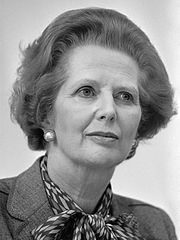
Back ثاتشرية Arabic Thatcherisme Catalan Thatcherismus Czech Thatcheriaeth Welsh Thatcherisme Danish Thatcherismus German Θατσερισμός Greek Thatcherismo Spanish Thatcherismo Basque تاچریسم Persian
| Part of the politics series on |
| Thatcherism |
|---|
 |
| Part of the Politics series on |
| Neoliberalism |
|---|
| This article is part of a series on |
| Conservatism in the United Kingdom |
|---|
 |
| ||
|---|---|---|
|
Secretary of State for Education and Science
Leader of the Opposition
Prime Minister of the United Kingdom
Policies
Appointments
Articles by ministry and term: 1979–1983
1983–1987
1987–1990
Post–prime minister
Publications
|
||
Thatcherism is a form of British conservative ideology named after Conservative Party leader Margaret Thatcher that relates to not just her political platform and particular policies but also her personal character and style of management while in office. Proponents of Thatcherism are referred to as Thatcherites. The term has been used to describe the principles of the British government under Thatcher from the 1979 general election to her resignation in 1990, but it also receives use in describing administrative efforts continuing into the Conservative governments under John Major and David Cameron throughout the 1990s and 2010s.[1] In international terms, Thatcherites have been described as a part of the general socio-economic movement known as neoliberalism, with different countries besides the United Kingdom (such as the United States) sharing similar policies around expansionary capitalism.[2]
Thatcherism represents a systematic, decisive rejection and reversal of the post-war consensus inside Great Britain in terms of governance, whereby the major political parties largely agreed on the central themes of Keynesianism, the welfare state, nationalised industry, and close regulation of the British economy before Thatcher's rise to prominence. Under her administration, there was one major exception to Thatcherite changes: the National Health Service (NHS), which was widely popular with the British public.[3] In 1982, Thatcher promised that the NHS was "safe in our hands".[4]
The exact terms of what makes up Thatcherism and its specific legacy in British history over the past decades are controversial. Ideologically, Thatcherism has been described by Nigel Lawson, Thatcher's Chancellor of the Exchequer from 1983 to 1989, as a political platform emphasising free markets with restrained government spending and tax cuts that gets coupled with British nationalism both at home and abroad.[5] Thatcher herself rarely used the word "Thatcherism". However, she gave a speech in Solihull during her campaign for the 1987 general election and included in a discussion of the economic successes the remark: "that's what I call Thatcherism".[6]
The Daily Telegraph stated in April 2008 that the programme of the next non-Conservative government, with Tony Blair's "New Labour" organisation governing the nation throughout the 1990s and 2000s, basically accepted the central reform measures of Thatcherism such as deregulation, privatisation of key national industries, maintaining a flexible labour market, marginalising the trade unions and centralising power from local authorities to central government.[7] While Blair distanced himself from certain aspects of Thatcherism earlier in his career, in his 2010 autobiography A Journey, he argued both that "Britain needed the industrial and economic reforms of the Thatcher period" and as well that "much of what she wanted to do in the 1980s was inevitable, a consequence not of ideology but of social and economic change."[8]
- ^ Gallas 2017, p. 1.
- ^ Gittins, Ross (18 July 2017). "The neoliberalism of Margaret Thatcher and Ronald Reagan has run its course". The Sydney Morning Herald. Retrieved 6 December 2022.
- ^ Campbell 2011, p. 173.
- ^ Klein 1985, pp. 41–58.
- ^ Lawson 1992, p. 64.
- ^ Campbell 2011, p. 517.
- ^ Kampfner, John (17 April 2008). "Margaret Thatcher, inspiration to New Labour". The Telegraph. Archived from the original on 12 January 2022. Retrieved 30 June 2011.
- ^ Blair 2010, p. 101.
© MMXXIII Rich X Search. We shall prevail. All rights reserved. Rich X Search
